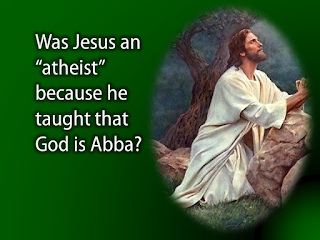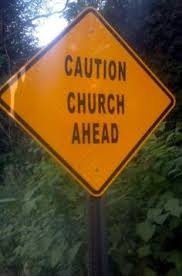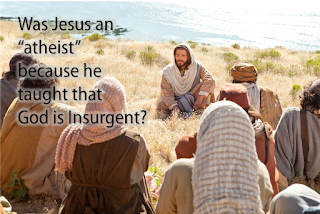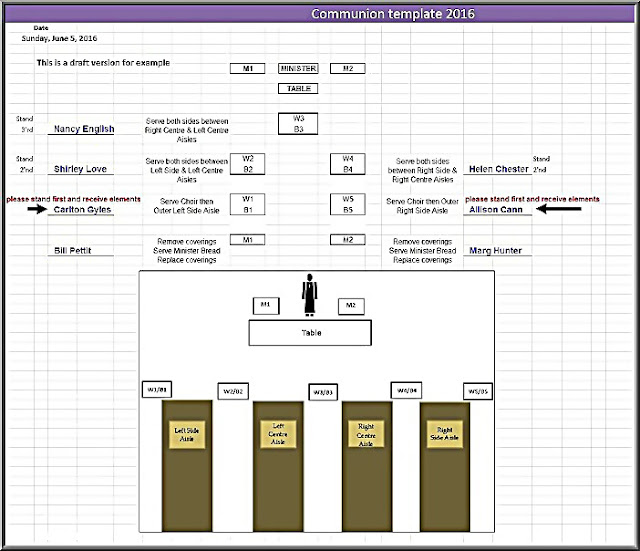Here is a short video to introduce the summer sermon series at St. Andrew's Hespeler:
Please join us this summer as we explore some important commandments and talk about how we might live them out today. Click HERE and then click "share" for options to share this video with your friends.
Was Jesus an “atheist” because he taught that God is Abba?
Hespeler, 19, June 2016 © Scott McAndless Long before the time of Jesus, it was not uncommon for people to use father language to talk about God and about various gods. Take the Romans, they loved to use father language to talk about their gods. The ruler of all the Roman gods was a fellow named Jupiter and his name actually meant “Father God” in primitive Latin. In addition, the Roman emperors were also worshipped as gods by the Romans because they were the so-called fathers of the nation.
But when the Romans spoke about their gods as being fathers, they had a very particular idea of fatherhood in mind. Fatherhood, in ancient Rome, meant one thing above all: authority. The Latin name for a male head of a family was paterfamilias: father of the family. And a paterfamiliaswas not just a warm and fuzzy dad figure sitting in a La-Z-Boy, wearing slippers and reading a newspaper. For the Romans, he was a man who had ultimate authority over every single person in his household.
| Long before the time of Jesus, it was not uncommon for people to use father language to talk about God and about various gods. Take the Romans, they loved to use father language to talk about their gods. The ruler of all the Roman gods was a fellow named Jupiter and his name actually meant “Father God” in primitive Latin. In addition, the Roman emperors were also worshipped as gods by the Romans because they were the so-called fathers of the nation. |
| #TodaysTweetableTruth Jesus called God Abba – a rejection of patriarchy and control, an embrace of the image of the caring householder. |
If you were like me, you were appalled and distressed and maybe depressed when you heard about the terrible events that unfolded in Orlando, Florida one week ago. The largest mass shooting in American History not carried out by the military. And one of the worst things about it is that it seems as if the crime was specifically targeted at a sexual minority group which had specifically gathered in one of the few places where they felt safe in society – destroying any sense of that safety.
I’m wondering, what can Jesus’ teaching about God as “Abba” say to us about such a terrible tragedy? Let me suggest this: if our God were merely a father – a kind of heavenly paterfamilias – who was all about authority and power, all about right and wrong, then I would be particularly discouraged today because that would mean that our only response to such a tragedy would be judgment and punishment. Some, I know, would be inclined to judge the victims in their minority status. I cannot do that. I cannot see (especially right now) how Christian judgement of sexual minorities who do not harm or rape anybody has made the world a better place. Judgement in that case only seems to make things worse. Some would focus on judging the criminal assassin and the communities that he has been associated with. That is little better, perhaps, but it is not good enough and as far as I can see and judgement alone will not make anything better.
But if God is “Abba,” how can that change our response? If God is Abba, if God is the householder who is burdened with the wellbeing of everyone within his earthly household, then God’s first question when looking at each one of us is not, “What have you done wrong that I may punish you?” It is, “What do you need. What are the special challenges you are dealing with that keep you from thriving?” That is a very different question and provides a very different orientation to us as we seek to make a difference in our world, especially with groups that have been targeted because of who they are and what makes them different. If God is Abba, this is something that gives me hope for a better world.
Sermon Video:
June 19 at St. Andrew’s Hespeler.
As usual, there are lots of good reasons to be at St. Andrew's Hespeler on a Sunday morning. June 19 will be no exception. Here are some highlights:
Continue reading »
- We will, of course, be celebrating Father's Day, praying for and seeking God's blessings on the fathers among us and who have shaped our lives.
- In response to the terrible hate crime perpetrated in Orlando last Sunday, we will pray and resolve to work for a better world and an end to the power of hatred for marginalized groups including LGBT people.
- Special musical guest: Robert Dwyer.
- Please note that, contrary to what was announced last Sunday, we will not be receiving new members this week. An important family matter for two of our candidates has meant that this will have to be postponed until June 26.
- Our sermon, "What Jesus an "atheist" because he taught that God is Abba," will look at the surprising things that Jesus taught about God when he called God "Abba. Turns out that abba doesn't mean what you may think!
Interesting factoids from St. Andrews Hespeler COS Blog
Country Page views
Well seem to be a hit in the USA > have to kinda dismiss this as computer bots searching the internet for tidbits and big data trends.
The France/Netherlands hits are cute.
Pageviews all time history is a welcome indication someone's reading > always a writers concern?
Page views today | 5 |
Page views yesterday | 168 |
Page views last month | 222 |
Page views all time history | 925 |
Hallelujah, Benediction Song
This Sunday I will complete a series of sermons where I have been examining some of the strange and wonderful things that Jesus taught about God. I'm not sure how many have noticed this, but as a part of this series I have been writing a benediction for each service to be sung by the congregation. Each benediction has gone with the radical teaching of Jesus (or his disciples) that we have been talking about.
All of these have been sung to the tune of Sinclair's Hallelujah (#294 in the Presbyterian Book of Praise).
Here is a YouTube video of the music (though we sang it much faster than that!): Sinclair's Hallelujah
As the series now comes to an end, I would like to present all of the verses that I have written. I keep singing them, I hope you might too:
1. God is Spirit so we worship
God in spirit and in truth.
Holy places are wherever
God our wounded hearts does soothe.
2. God is Father, Son and Spirit,
Three in one and one in three,
Like a dance that spins forever
Throughout all eternity.
Hallelujah, Hallelujah, Hallelujah, Hallelujah,
Hallelujah, Hallelujah, Hallelujah, Hallelujah,
3. God is calling us to mission:
“Clothe the naked, Feed the starving.
Then your healing times are coming
And your darkness is dispersing.”
4. God’s not watching from a distance
God is present, here belonging.
When we pray we know God hears us
And joins in our deepest longing.
Hallelujah, Hallelujah, Hallelujah, Hallelujah,
Hallelujah, Hallelujah, Hallelujah, Hallelujah,
5. God’s committed to the outcasts,
The forgotten and the poorest,
To a kingdom where the lowest
Exchange places with the greatest.
6. God is Abba, like a Father
Who will all his family nourish,
Giving to each one according
To their needs that they may flourish.
Hallelujah, Hallelujah, Hallelujah, Hallelujah,
Hallelujah, Hallelujah, Hallelujah, Hallelujah,
Sometimes all you need is a good laugh..........whoop, whoop
I apologize if this offends you...but I find it funny <lol>
Just a note to confirm that the Congregation has been made aware of the imminent re-roofing of the newer section of the church. The shingles have exceeded their lifetime after 12 years. Before we have water damage we are being pro-active to move in the summer when working and a satisfactory "seal" can be achieved before the cold of winter.
Session approved in June the roof quote, for the newer section of the church, from Thompson Roofing Inc. in the amount of $19,549.00 including HST and dated October, 2nd 2015. This has been confirmed as the lowest quote of three by Operations. Thompson Roofing has completed work for the church previously (to our satisfaction) and that they will honour the October, 2nd 2015 quote.
- Thompson Roofing included a statement indicating all employees are covered by Workers Compensation and are fully insured.
- The shingles being used are stated as Gaf Timberline HD shingles with Timbertex Ridge Capping. Their quote indicates shingles have a lifetime warranty and includes a transferable 10-year guarantee to workmanship.
- The funds to cover this project are:
the HST residue of funds on hand of +/- $14,200.00 from the Share the Wealth project; (2) approx. $3,400.00 from Capital Endowment fund; (3) any giving from the congregation or others for this project; (4) There will be an HST refund of about $1,200.00 in connection with this project; (5) $2,100 from the General Endowment fund income previously allocated by Session to the Video projection system, to be redirected to the roof project.
- The work will start in July 2016.
- The Operations Committee supports the above details.
- A modest additional cost (we would get an estimate in advance of moving forward) of adding additional vents on the one side of the building to provide better air circulation is being examined but not confirmed.
for/ Session, Operations, and Stewardship
Rob Hodgson, COS
Was Jesus an “atheist” because he taught that God is insurgent?
Hespeler, 12 June, 2016 © Scott McAndless
Luke 6:20-31, Matthew 5:1-16, Isaiah 1:10-18
If you were given the chance to invent a god – a god that everyone else would have to acknowledge, worship and obey – what would your god look like? What would be important to your god? Well, that would probably depend, wouldn’t it? It would depend on you and what your priorities were. |
If you were a committed vegetarian, for example, the god you would invent would probably be very likely to get judgy about people killing animals for food. If your greatest passion this summer was for your country to win more Olympic medals, then you might invent a god who closely followed the games and cared about the outcomes. If you were poor, you might invent a god who called for the rich to give away some of their wealth to the poor but if you were rich – oh, if you were rich – you can be very sure that the god that you would invent would be very keen on making sure that rich folks got to keep whatever was theirs.
Now you might say that it is a little bit silly to talk like that about a god that someone invents because you don’t get to invent God. God just is and it is up to us to come to terms with the God that we discover in the scriptures and in other places. And of course that is true.
But you are kidding yourself if you think that human beings have not had a role in shaping the ways in which God has been pictured, imagined and talked about down through the ages. Humanity may have been created in God’s image, but the reality is that humanity then turned around and imagined God according to their creation. This was inevitable because we had no language and no concepts that could possibly grasp the true nature of God. We had to define him in terms we could relate to.
But while, to a certain degree, every human who has ever thought about God has engaged in this project of imagining God in their own image, some have had certain advantages. Men, for example, have historically had a much bigger hand in creating the imagery and stories about God which is probably why people have traditionally been far more likely to think of God as male and interested in keeping men in charge of things.
Wealthy and powerful people in general have also always had ways of making sure that their particular images of God get the most attention. They have done it by being patrons of the temples and religious institutions, by being patrons of the arts, by sponsoring prophets and other preachers. I’m not saying that this is necessarily a bad thing. This way of doing things has brought with it some of the most beautiful architecture, art, music and words ever created in the history of the world under the patronage of wealthy folks for the sake of religion.
But another result of this is also that the dominant image of God in our society is of a God who tends to share the priorities and interests of the wealthy and powerful. For example, back in the Middle Ages, it was the accepted doctrine and teaching of the Catholic Church that God had assigned to every member of society a place. God had made some to be kings, others to be lords and masters and priests, some to be merchants. But the vast majority of the people, God had made to be peasants and serfs and to live in poverty as they served the needs of everyone else.
“The great chain of being,” they called it, and taught that its links wound all the way from highest heaven to the lowest beast on earth. Everyone had a place and everyone had better stay in that place or else! When the church preached that such a picture of society was God’s will, that made people who questioned the way that society worked or who demanded change not only dangerous rebels but also even more dangerous heretics.
Now, things have, I will admit, improved a great deal since the Middle Ages. We now believe in things like social mobility and reject the idea of a class system. But I’m not sure that, for most people, the overall picture of God’s priorities has changed all that much. So, while people no longer believe that God ordained a great chain of being as an unchangeable order for society, they tend to still believe that God is totally invested in the present order of things. God, we seem to assume, wants people just to be happy with how things are and not to ask for a great deal in terms of change. The rich get to keep all their stuff – after all, doesn’t God say, “thou shalt not steal” – and the poor should just keep their heads down and work hard and maybe eventually they’ll get rich too.
God, we assume, is a conservative God, not necessarily a capital C political party Conservative God (though there are some who assume that) – but at least conservative in the sense that he wants to conserve the present social order of things – doesn’t want troublemakers to rock the boat or seek to change things. This idea is so taken for granted that anytime anyone does anything that challenges the present social order of things our very first reaction is often to think that there is something amoral or even atheistic about that person.
But that God (the God invested in the status quo) was not the God that Jesus believed in. The God that Jesus proclaimed was a God who was not invested in the present social order of things but was rather committed to upsetting that order. One of Jesus’ favourite sayings, one that he seems to have repeated on many occasions was, “The first shall be last and the last shall be first.” You simply could not find a way to call for a complete reversal of the order of society in fewer words than that. Jesus proclaimed something that he called the kingdom of God which was, if you listen closely to what he actually said, mostly about transforming society into a place where, well, the first were last and the last were first.
But perhaps there is no place where Jesus laid out his vision of a transformed society more clearly than in the passage we read this morning from the Gospel of Luke that I call the Blessings and Curses of Jesus of Nazareth. This is Luke’s version of the much more famous passage known as the Beatitudes in the Gospel of Matthew. People often prefer Matthew’s presentation of these sayings because it is possible to read those sayings in a purely spiritual way. I mean, it can make a certain amount of sense to think of those who are “poor in spirit” or those who “hunger and thirst for righteousness,” as being blessed because those sound like spiritual conditions. They don’t need to have anything to do with real economic poverty or actual physical hunger.
But the version in Luke’s Gospel is not going to let us off the hook so easily. In Luke’s Gospel, Jesus speaks far more plainly. Those who are blessed, he says, are the poor, the hungry and those who are weeping. And, just in case we miss the point, Jesus goes on from there to state even more starkly that those who are rich, well-fed and laughing are cursed. We can’t just write this off and say that Jesus was only talking about spiritual truths and realities here. He was talking about a God who was passionately committed to bring about serious social change.
That was the God that Jesus believed in and whose kingdom he proclaimed. And, make no mistake, it was not the same God that his enemies believed in. The Jewish rulers and priests did not believe in a God who was determined to bless the poor and curse the rich. They were pretty sure that God was committed to making sure that the rulers kept their wealth and the priests kept their power. And the Romans especially didn’t believe in the kind of God that Jesus did. Their gods were quite committed to making sure that Rome got richer while everyone else remained poorer.
It was the refusal of Jesus to acknowledge this God of Rome and the Jewish rulers, more than anything else, that got him arrested and killed. If Jesus had restricted himself to only teaching spiritual truths and speaking about a life after death with no real economic and social implications for here and now, they might have mocked him, marginalized him, even locked him up, but they wouldn’t have bothered to kill him. But to believe in a God who wants to bring about change in how things work, that is the most dangerous kind of belief there is.
I think it is very important for us to acknowledge how very radical the God that Jesus was talking about was: an insurgent God rather than the God we have always heard of – the one who is interested in keeping everything in good order. But there is a real question here about what it means to follow Jesus’ example and to serve the God that he proclaimed.
There is one thing that I am sure that it does not mean. It doesn’t mean that we support all movements that seek to bring about social change. There have been many movements throughout history that have set out to bring social change, and many of them have sought to use any and all means to create that change including violence.
Jesus could have created that kind of movement. He was living in a time when his nation of Israel was occupied by a brutal occupying Roman army. He could have called for armed revolt and revolution but he explicitly rejected any idea of bringing change through violence. “Bless those who curse you,” he taught, “pray for those who abuse you. If anyone strikes you on the cheek, offer the other also.” But just because he would not resort to violence did not mean that he didn’t expect things to change. It was just that he had no faith that violence could bring that change. It could only make things worse. Only God and the grace of God shown through us can transform society.
But actually it is because we believe in a God who is committed to a transformation of society that we are freed from the need to resort to violence to bring about change. Martin Luther King Jr. was a man who, in his day, achieved some enormous social change in American society and, inspired by the example of Jesus, he did it without resorting to violence. It wasn’t easy. There were many times when his followers wanted to give up on the nonviolent approach and fight back. One of the things that he said that gave people hope was this, “Let us realize the arc of the moral universe is long, but it bends toward justice.”
What he was saying was that our faith in a God who is committed to justice – to the creation of a society where there is equality and opportunity for all – means that we don’t think we have to bring it about by ourselves. We don’t have to rush that change or make it to happen through violence. We can even take violence and persecution directed towards us with patience and endurance because we trust that, though it may take time (the arc of the universe is long), God will make sure it ends up with things being more just rather than less.
It is quite possible for people to grow up in the church, hear people talking about God all the time, and yet come away with the notion that God is only really interested in maintaining the status quo and making sure that nobody makes any waves by asking for change. A lot of people seem to think that such a God is the only God there is. But I am afraid that I cannot believe in such a God any more. I am not alone. There are too many people who are saying, I’m not going to believe in that God. What is the use of a God who is not going to let anything change? This is, as far as I can see, one of the reasons why atheism is a growing movement in the world today.
This is a dangerous trend, but not merely because people are abandoning God. It is dangerous because of where it may lead our society. When people no longer believe in a God who makes sure that the long arc of the moral universe bends towards justice, they start to feel like they are the ones who have to make sure that it bends that way. And when people start to feel that way, it is not long before they start to resort to things like violence to make sure it happens. We cannot afford that.
So, yes, I think it is vitally important that we proclaim today the God that Jesus knew – a God committed to social change towards justice. The consequences of any other approach are too dangerous to consider.
| #TodaysTweetableTruth Jesus' God is committed to social change towards justice. That is why we have #hope & don't need 2 resort 2 #violence.
|
On June, 8th I wrote of the changes required to right-size the financial plans of St. Andrews. Below is a change being implemented for a lot of the same reasons.
As you can expect there will be other changes that track the realization we can no longer just follow normal operating modes into the future. One aspect of worship that needs a tweak is the way communion has been staffed. For those of you that pay attention, a full communion required ten Elder/Deacon/Servers. Full communions are observed in March, June, October and December in any given year. The dates move a bit in response to the calendar year but remain relatively static. I’d like to demonstrate how we can reduce the servers from ten to just seven without affecting the service or efficiency. It will as well maintain the solemn decorum of these proceedings.
Back in the day, we had a very large Session of almost 30 Elders at any given time. Scheduling was relatively easy – well scheduling is never easy but you get my point, I hope. Today we have roughly 20 some Deacon/Elders to choose from with the same four full communions and four intinction communions. Even allowing additional servers from non-commissioned members of the congregation has not been enough to fill the roster for communions. Note Session informally revised the requirement from only Elders to allow Deacons and longtime congregational members some time ago.
Trying as we might, finding sufficient servers for any particular service remained daunting. Some of you have commented on why the flurry of activity at the last minute…now you know. Life has changed dramatically since the day of 30 Elders. The number of servers at full communions needs to be reduced. Intinction services require much fewer servers (between 0 and 6) to complete and will remain unchanged.
So the diagram shown arranges the same full communion with just seven servers. You may have never seen the communion roster depicted and I'd like to allow all to see the mechanics of it. There are two servers on the dais assisting Rev. Scott and the five remaining each serve an aisle as shown. Easy pea’sy we have created a solution to scheduling issues (hopefully).
Comments, suggestions, and advice are always appreciated – give me a ring sometime! Rob, COS
A big thank you for some wonderful Hope Clothing volunteers
Today at St. Andrew's we had a special lunch to celebrate our really wonderful group of volunteers who help out regularly at Hope Clothing. We couldn't help all of our local families as we do without their faithful assistance.
Want to know how dedicated these people are?
They are so dedicated that we almost had to drag them out of the room where they were busily and happily sorting and folding clothes so that they would come and eat the special meal we had prepared to thank them.
Thanks to Jean, Carol, Joni and Karen for preparing the lunch and thank you (so much!) to Creme, Hespeler's wonderful corner café, for donating some really tasty pastries for dessert!














